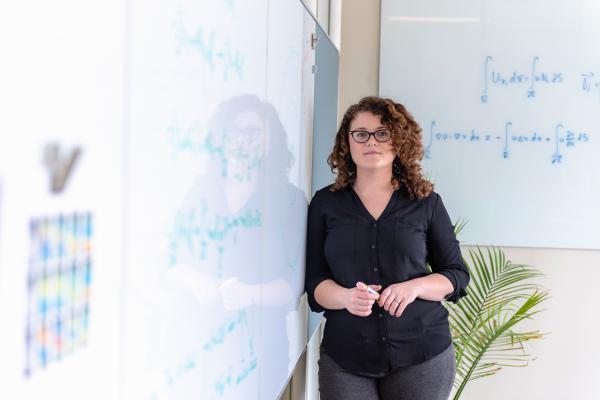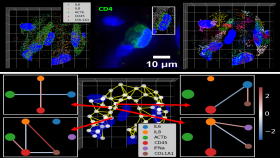Minneapolis, MN – Eva Dyer, assistant professor in the Wallace H. Coulter Department of Biomedical Engineering at Georgia Tech and Emory University, has been named one of three recipients of the 2020 McKnight Technological Innovations in Neuroscience Awards. The McKnight Endowment Fund for Neuroscience (MEFN) announced the three winners of $600,000 in grant funding today.
The researchers’ projects were recognized for their ability to fundamentally change the way neuroscience research is conducted. Each of the projects will receive a total of $200,000 over the next two years, advancing the development of these groundbreaking technologies used to map, monitor, and model brain function.
In addition to Dyer, the other winners are Rikky Muller (University of California-Berkeley) and Kai Zinn (California Institute of Technology).
Since the McKnight Technological Innovations in Neuroscience Award was established in 1999, the MEFN has contributed more than $14.5 million to innovative technologies for neuroscience through this award mechanism. The MEFN is especially interested in work that takes new and novel approaches to advancing the ability to manipulate and analyze brain function. Technologies developed with McKnight support must ultimately be made available to other scientists.
“It has been a thrill to see the ingenuity that our applicants are bringing to new neurotechnologies,” said Markus Meister, chair of the awards committee and professor of biological sciences at the California Institute of Technology. “This year, we faced a tough choice among many exciting developments, and our awards span a broad range, from computational methods for big data from the brain, to fancy optics for the control of light beams, to a clever molecular strategy for surveying protein expression in neurons.”
Dyer, a researcher in the Petit Institute for Bioengineering and Bioscience at Georgia Tech, focuses her work on the development of machine learning algorithms to compare large datasets of neural activity and find both macro- and neuron-level patterns that correspond to specific states and behaviors in freely-behaving animals.
The ability to observe and record neural data over large parts of the brain has resulted in enormous amounts of data, making it possible to find patterns in the data that can explain how many neurons work together to encode information about the world. Even with new advances in finding low-dimensional patterns in datasets, it is still challenging to compare multiple large-scale recordings, whether it be over long periods of time, or across different individuals solving the same or similar tasks, or across disease states.
Dyer’s experience using machine learning (ML) to decode brain activity has led her to a novel solution to identify patterns in multiple large neural datasets. New cryptography-inspired mathematical rules guide the algorithms to identify similar patterns in separate data sets, looking specifically to match the neural activity generated by different brain states as a starting point for bringing the data into alignment. Aligning neural activity can show how neural patterns are related to the behavior and state of the subject as well as prevent corruption by noise, and provides a critical stepping-stone for more powerful analysis techniques.
Her second aim will help researchers refocus on single neurons to understand how they contribute to the overall changes in neural activity, and whether they can be used to predict specific brain states. The research will further explore whether differences in behaviors can be traced back to specific cell types, and how the differences seen across datasets can be used to characterize variation across individual animals. The ability to decode and compare large neural datasets will prove invaluable in neurological research by indicating how neurodegenerative disease affects the brain’s processing of information.
About the McKnight Endowment Fund for Neuroscience
The McKnight Endowment Fund for Neuroscience is an independent organization funded solely by The McKnight Foundation of Minneapolis, Minnesota, and led by a board of prominent neuroscientists from around the country. The McKnight Foundation has supported neuroscience research since 1977. The Foundation established the Endowment Fund in 1986 to carry out one of the intentions of founder William L. McKnight (1887-1979). One of the early leaders of the 3M Company, he had a personal interest in memory and brain diseases and wanted part of his legacy used to help find cures. The Endowment Fund makes three types of awards each year. In addition to the McKnight Scholar Awards, they are the McKnight Technological Innovations in Neuroscience Awards, providing seed money to develop technical inventions to enhance brain research; and the McKnight Neurobiology of Brain Disorders Awards, for scientists working to apply the knowledge achieved through translational and clinical research to human brain disorders.
Media Contact
Keywords
Latest BME News
Commercialization program in Coulter BME announces project teams who will receive support to get their research to market.
Courses in the Wallace H. Coulter Department of Biomedical Engineering are being reformatted to incorporate AI and machine learning so students are prepared for a data-driven biotech sector.
Influenced by her mother's journey in engineering, Sriya Surapaneni hopes to inspire other young women in the field.
Coulter BME Professor Earns Tenure, Eyes Future of Innovation in Health and Medicine
The grant will fund the development of cutting-edge technology that could detect colorectal cancer through a simple breath test
The surgical support device landed Coulter BME its 4th consecutive win for the College of Engineering competition.
New research from Georgia Tech helps doctors predict how therapies will interact with a child's immune system, potentially improving outcomes and reducing risks.








